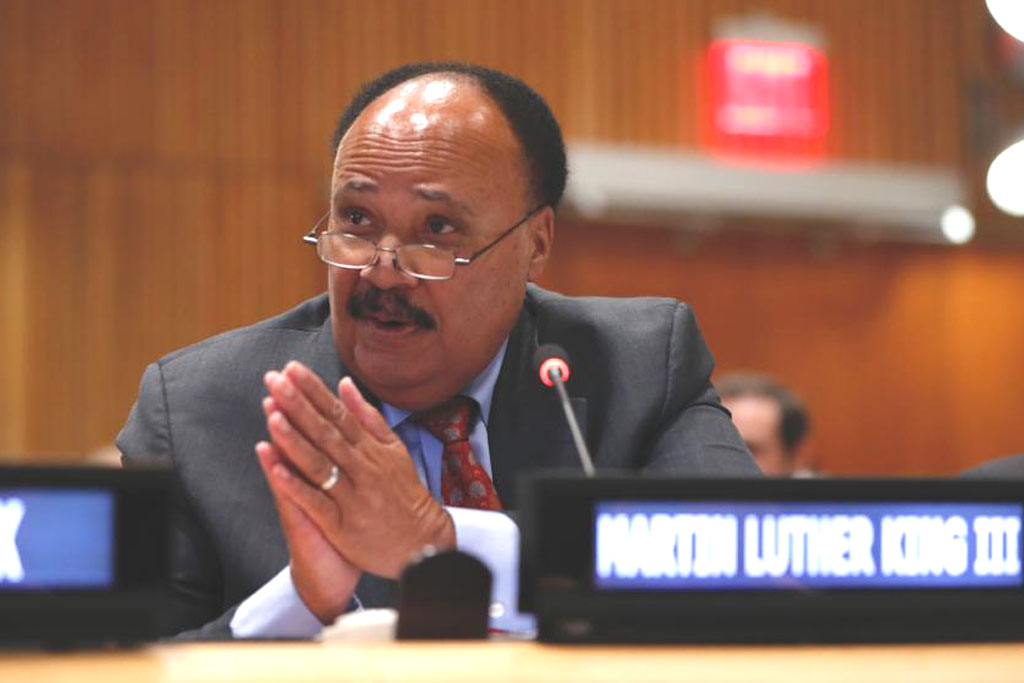As an American Baptist minister and activist, Dr. King was a highly-respected spokesman. The youngest man to receive the Nobel Peace Prize and leader in the American civil rights movement from 1955 until his assassination in 1968.
Martin Luther King III, the first-born son of the late Reverend Dr. Martin Luther King Jr. and Coretta Scott King, has devoted his entire life to shepherding and building upon his parents’ legacy. With his wife Arndrea Waters King and young daughter Yolanda Renee King, they continue to dedicate their life’s work to social progress.
Here is the telephone exchange that Martin Luther King III (based in Atlanta, United States), and UN Today had a few days ago.
You have inherited not only a family name, but above all the constant defense of human rights, rights that are constantly being questioned and challenged. A large part of global society looks to your father, and therefore to you, as a beacon. How much did this affect you as a child?
I was shielded from a lot as a child, but it still affected me. I knew my father, my mother, and their team were working to create a better world for all of God’s children.
What disturbs me today, as you mentioned, is that much of what my parents fought for is now being rolled back. That’s the biggest challenge: I worry about my daughter and the rights her generation will have. She was born in 2008, but today, she has fewer rights than when she was born, particularly because of what the Supreme Court is doing to women’s rights. It feels like society is moving backward, and I’m concerned about how we can move forward. We’re organizing a march to commemorate the 1963 March on Washington, where my father gave his “I Have a Dream” speech. We’re calling on people across the country to rally. When we see hatred being enacted into law—whether against Jews, Arabs, or people of color—we must come together and work to realize the dream my father envisioned in 1963, a dream that is far from complete.
In terms of how this legacy affects me, it strengthens my belief that every person has a right not to be mistreated. We also see discrimination against communities such as LGBTQIA+, whose rights are similarly under threat.
This is not the vision Martin Luther King Jr. and Coretta Scott King had. They dreamed of a beloved community where everyone could achieve their dreams and be treated with dignity and respect. We must strive to create that climate today.
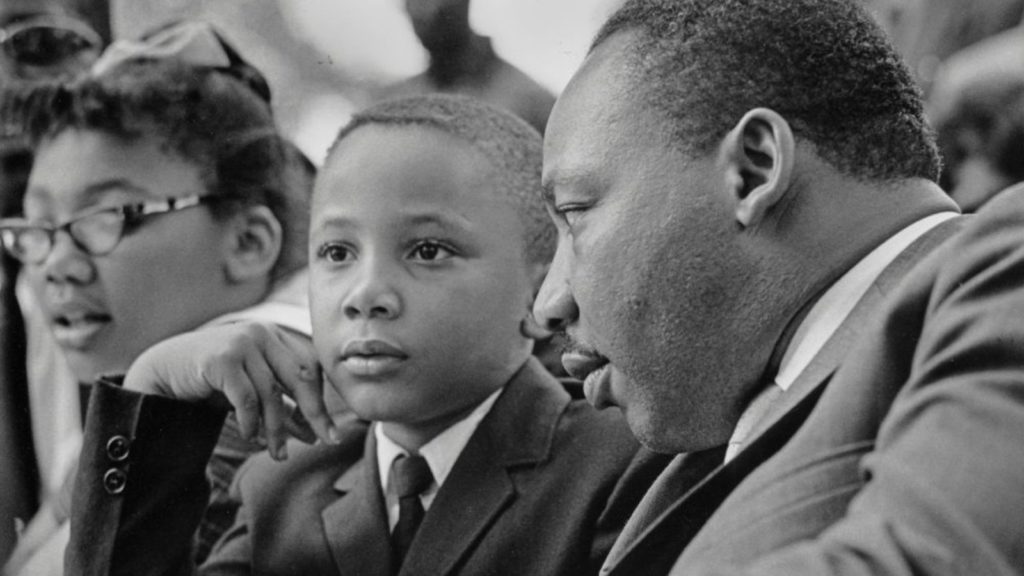
Martin Luther King Jr, Martin Luther King III, and Yolanda King
When do you think it was a switch that you made from being “the son of” to being yourself with your own values and your own career dreams?
When I finished college, I felt a calling to a body of work. My mother used to say, “You don’t have to be a minister, a civil rights leader, or even go to the University of Michigan, where your father went—just be the best you can be, and we’ll support you.” I ended up in college and became involved in civil rights activism. When I was about 14 or 15, I realized I could dedicate my life to this cause, and by the time I was 23, I knew there was work to be done to achieve my parents’ dream. How do we create a world where people coexist peacefully and are treated with dignity and respect?
Creating this climate takes consistent effort, and that’s been my focus. It’s especially pressing for me because my 15-year-old daughter has fewer rights now than when she was born, which is unacceptable.
My father used to say, “Oppression is legislated,” and unfortunately, it still is today. We must change this situation to create a better nation and world for all of God’s children.
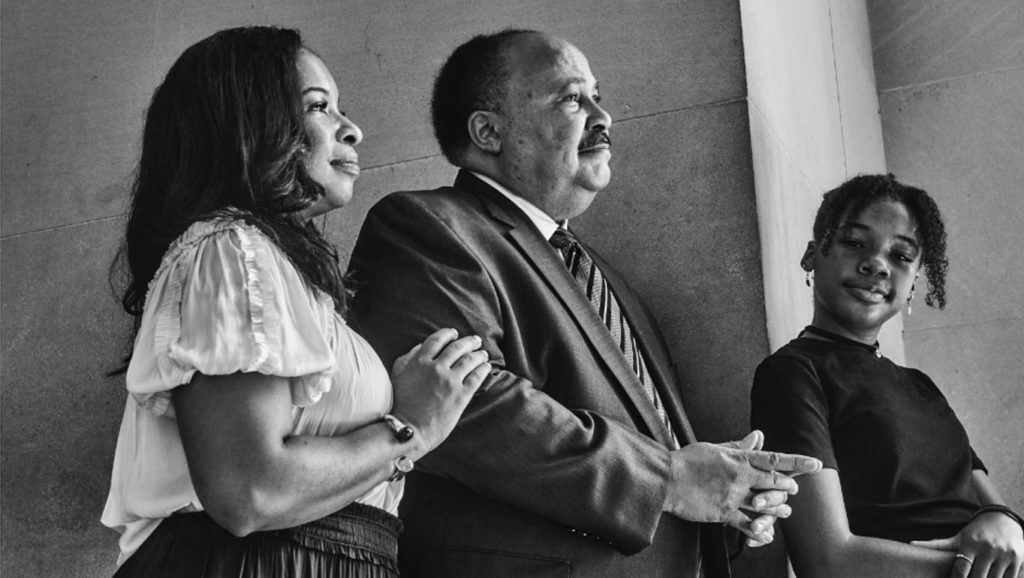
Arndrea Waters King, Martin Luther King III and Yolanda Renee King.
One of your father’s quotes was “Injustice anywhere is a threat to justice everywhere”. One of yours says: “We all have a contribution to make. Get engaged. Get involved.” How do you encourage the new generations to get involved when they are exposed to politicians who are inconsistent between what they say and what they do?
As a society, we need to hold politicians accountable. That’s why protecting and expanding the right to vote is crucial—it’s where change begins. In democracies, where we have this right, we must make voting as accessible as possible. It’s concerning to see a Supreme Court with no ethical standards or accountability. Recent reports indicate a troubling coziness between some justices and wealthy individuals. We need guidelines for ethics and accountability.
One potential solution is expanding the Supreme Court to create a balanced and principled institution. Similarly, we need a federal electoral act to strengthen voting rights, which the Supreme Court weakened in 2013. There are forces making it harder for people to vote, but we should be doing the opposite: voting should be simple, and secure, and we have the technology to make it so.
Young people are engaging more over the past 15 to 20 years. Following the tragic Parkland shooting, for example, students organized a gathering of 800,000 people in 2018 and pushed for legislative changes. The feminist movement, Black Lives Matter, and other movements have mobilized millions. We need to maximize voter turnout during every election to drive change.
We’ve seen the engagement of young people over the last 15 or 20 years. After the death of the students in Parkland who died in a tragic shooting, their friends organised a meeting over 800,000 people in 2018 and actually got some initial legislation.
We see the growing feminist movement, where millions of women mobilized after the election of former President Trump. We see Black Lives Matter, which was actually organised after the killing of Trayvon Martin more than 10 years ago, and we have seen progress. All of these communities, need to come together and work on a strategy that leads to action.
The most important thing that we all have to do is to make sure that we maximise voter turnout during every election, whatever year it is. Probably this year there will be elections in 2023, but next year we will have a personal election and we need more and more people to participate. That’s how we start the process of creating change in our nation.
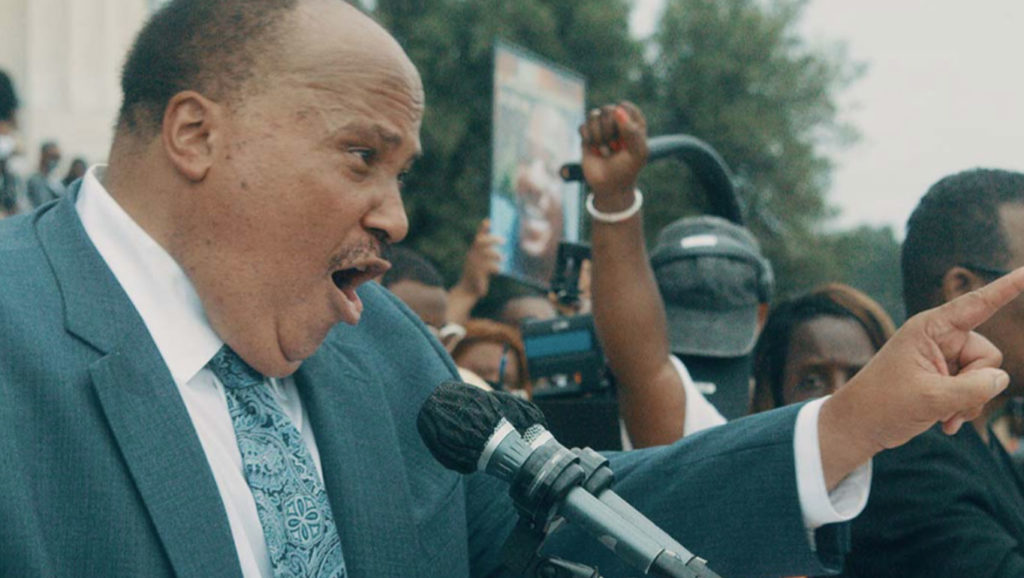
Martin Luther King III giving a speech as a human rights activist. He serves as an ambassador for global human rights, the movement for social change and civil rights by addressing critical issues such as poverty, injustice and violence.
Your daughter, Yolanda Renee King, is 15 years old. Could you tell me how she feels about the social inheritance she is receiving?
She’s always been passionate about several issues. When she was just two or three, she questioned why people lived on the streets and how we could help the homeless. At nine, she participated in the 2018 “March for Our Lives,” advocating for responsible gun legislation and a safer world. Now, she’s creating her own platform, free from any pressure from us. We’ve nurtured a climate where she feels empowered to make a difference.
Journalists sometimes ask if she wants to follow in her grandfather’s footsteps, to which she responds, “I admire and respect my grandfather’s legacy, but I want to create my own path.” She’s already committed to doing so; she has a children’s book, *We Dream a World*, coming out in January 2024, where she envisions a liberated world.
You are a global ambassador for human rights. From a global perspective, what do you think is the most endangered human right today?
It’s difficult to single out one. Climate stability and workers’ rights to fair wages are two pressing issues, as well as the rise of artificial intelligence, which could replace human jobs, and modern slavery. All these priorities are interconnected, and we need a strategic plan. The UN’s Sustainable Development Goals are vital, but as a global community, we aren’t doing enough to implement them. The pervasive greed of industrialists and corporations is a significant issue, as many prioritize profit over humanity’s survival.
This critical moment demands a paradigm shift if we are to save humanity and ensure our children’s future. Once, leaders would plan for the next generation, but now, we must urgently create a generation of leaders dedicated to the world’s preservation.
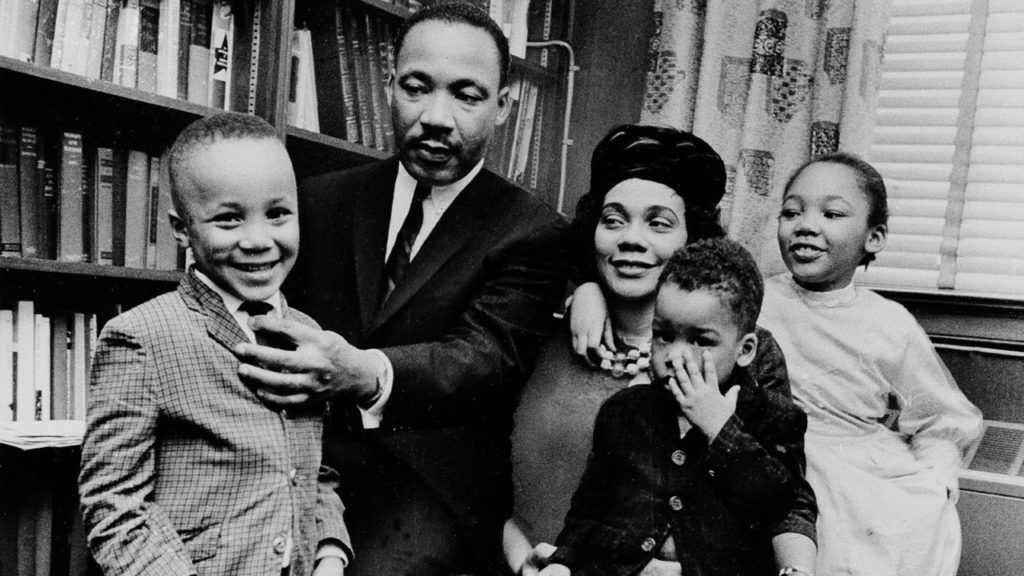
Martin Luther King III, Martin Luther King Jr, Coretta Scott King, Bernice King and Yolanda King.
You recently wrote, “Together, we can rise above the noise and find common sense solutions to even the world’s hardest problems.” But with societies facing different realities, don’t “together” and “common sense” sometimes seem at odds?
Looking back, I might refine that statement. The goal is to create win-win situations, not that everyone gets everything they want. Common sense should guide us to responses that work for everyone, though democracy naturally includes diverse social visions. Each government should strive to act in the people’s best interests. Compromise is essential; we need people willing to come to the table to discuss and collaborate.
The ethnic mixing driven by relationships and migration has made a person’s color less significant than other cultural aspects. Do you think racial prejudices may one day be a thing of the past?
In the U.S., demographic shifts are occurring, with black and brown communities now constituting a larger share of the population. This shift has generated concern among some, leading to attempts to maintain old power dynamics through restrictive policies.
But integration is inevitable. Children grow up among diverse communities, and while resistance persists, racial divides will diminish as society evolves. Racial identity is significant now, but as communities blend, race will likely become less defining.
Do you believe that the United Nations provides a fair and expeditious platform for action to pursue human rights claims?
The UN is limited by its structure, particularly the Security Council’s veto power, which can obstruct progress. Ideally, democratic principles would prevail, but a single member can block proposals, which undermines timely action.
If you had to pass a message to the United Nations civil servants, what that would be?
My message would be one of gratitude. They do critical work every day, and we need them to keep striving for a better world. Civil servants are indispensable, working tirelessly across fields to make society function, whether in health services, food distribution, or civil infrastructure. Their dedication is crucial, and I commend their ongoing commitment.



